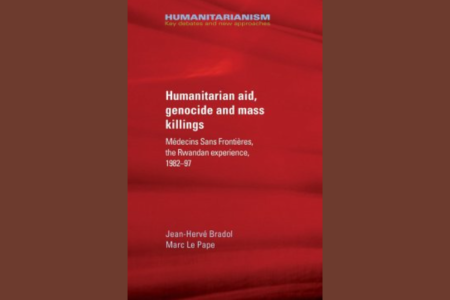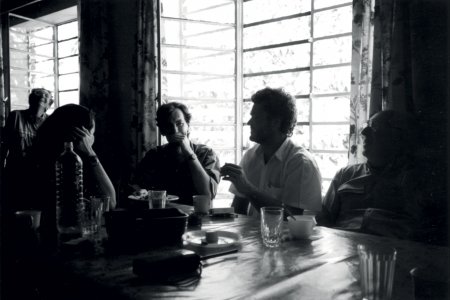Le Grand Voyage d'Alice
Jean-Hervé Bradol
The comic book "Le Grand Voyage d'Alice" was drawn by Gaspard Talmasse and published by La boîte à bulles on November 17th. The preface of this comic book was written by Dr. Jean-Hervé Bradol, former president of MSF and director of studies at the Reflection center of MSF (MSF-Crash). The book won the MSF prize at the Carnet de voyages Festival in Clermont-Ferrand, held from November 19th to the 21st. The book is only available in French.
Gitarama, 1994, in the south of Rwanda. Alice, 5 years old, lived a peaceful childhood with her parents and little sisters. Her life suddenly changes when the genocide of the Tutsi breaks out and she is forced to leave her village. With her family, but also Rose, a little Tutsi girl, she leaves on the burning roads of the Democratic Republic of Congo - Zaire, at the time - fleeing the advancing of (Rwandan Patriotic Front) RPF troops. She grows up in this climate of total insecurity, going from refugee camps to makeshift camps, sometimes coming back to an almost normal life before new attacks hit, before having to escape again, and death always lurking around the corner... Until the day when, following a new attack, she loses track of her mother, and finds herself alone with her little sister. She will eventually be taken in and repatriated to Rwanda in November 1997 but will remain for many years without news of her family... Gaspard Talmasse delivers here a singular, poignant and very accurate testimony, that of his wife. To tell the story of this several-thousand-kilometers odyssey, the author chooses to tell the story from the young Alice’s point of view, to best transcribe her truth.
Looking through Alice’s eyes
by Jean-Hervé Bradol, Médecins sans Frontières
A child's story cannot summarize all the mass crimes of which the Rwandans were victims during the 1990s. Alice tells us her own story. How she crossed the Congo on foot for nearly 2000 kilometers, from East to West. Three out of four people in these fleeing groups are women and children. Among them are also militiamen and soldiers who, before losing the war and leaving Rwanda in 1994, committed genocide against their Tutsi compatriots. There are around estimated 800 000 victims. The victors of the Rwandan civil war and their Congolese allies went after these Rwandan refugees in Congo. They tracked them down, used humanitarian aid to trap them. When they found them, they made no bones about it. Children of all ages, pregnant women, the elderly, everyone was targeted. This explains why, despite exhaustion, hunger, disease, wild animals, and terror, some of these refugees have continued to walk. Alice is a survivor, and she tells us all about it.
We knew about this story because among these people on the run, as in all categories of populations victims of mass crimes in the Great Lakes region of Africa, there were colleagues of Médecins Sans Frontières. Many thanks to Alice and Gaspard for telling us, with accuracy and delicacy, their version of this story that we have in common.
To cite this content :
Jean-Hervé Bradol, “Le Grand Voyage d'Alice”, 17 novembre 2021, URL : https://msf-crash.org/en/blog/war-and-humanitarianism/le-grand-voyage-dalice
If you would like to comment on this article, you can find us on social media or contact us here:
Contribute




Add new comment